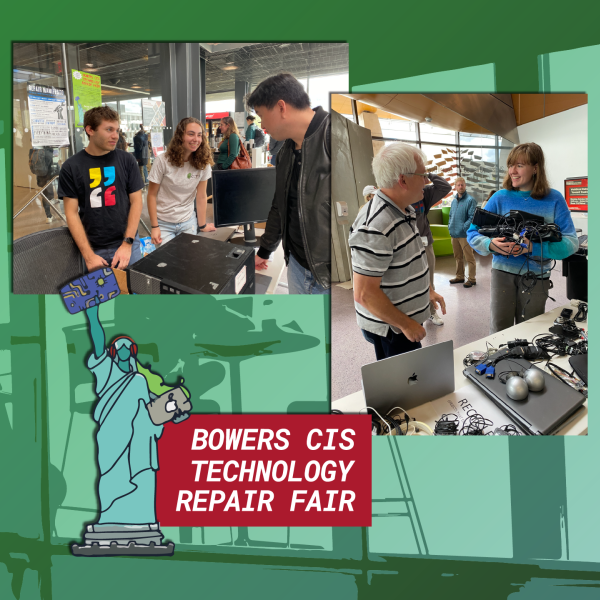November 16, 2023
By Patricia Waldron
Volunteers saved 10 desktop computers, seven laptops, 14 monitors, countless cords and chargers, and one electronic cat toy from becoming e-waste at the first Technology Repair Fair, held in the lobby of Gates Hall on Oct. 13.
Dylan Van Bramer ’25, a computer science major, organized the fair with Steven Jackson, professor of information science and science and technology studies. They received support from the Cornell Ann S. Bowers College of Computing and Information Science, the Campus Sustainability Office, and the Cornell Computer Reuse Association (CCRA). The Technology Repair Fair helped visitors to repair, reuse, or recycle their old or damaged devices, while encouraging the Cornell Bowers CIS community to be more aware of the environmental impacts of computing and the benefits of designing repairable tech.
Each year, Cornell disposes about 100 tons of e-waste, but that number has remained stagnant for more than 10 years, said Ana Suppé ’23, an environmental science and sustainability major. Worldwide, we generated more than 59 million tons of e-waste in 2019 – an increase of 21% over five years, according to a 2020 report from the United Nations. These computers, tablets, phones, batteries, cords, and other devices require large amounts of resources, both to produce and dispose of correctly.
To reduce the amount of e-waste generated each year, a growing “right to repair” movement is encouraging people to fix their own devices and lobbying for laws that require manufacturers to make the repair process easier.
“Our goal was to keep devices in people's hands and out of landfills as much as possible,” said Jackson. “A lot of the current design paradigms in computing in general, and consumer electronics, is really about keeping people locked out of their devices. This is partly a move against that – to get people more aware of the possibilities of repair – and to change the way people imagine and practice computing.”
Van Bramer was inspired to organize the Technology Repair Fair after taking Jackson’s course, Computing on Earth (INFO 4260). The course covers the environmental dimensions and consequences of computing, which include the sourcing and extracting of minerals, the resources consumed to produce the devices, the energy and water used to power data centers and AI models, and the ultimate impacts of e-waste.
“We want to get it in people's minds that computing isn't just something that happens in the cloud,” Van Bramer said. “There's a physicality to it.”
Members of the CCRA were on hand with the tools and know-how to show people how to open devices and see what’s inside. Since 2006, the CCRA has refurbished more than 5,000 donated computers and provided them free of charge to organizations all around the world, from Ithaca to Tanzania.
“We meet every Sunday as a group, open them up, see what's wrong, reinstall the software, and fix up any problems,” said Reid Fleishman ‘25, vice president of CCRA and an information science major.
“A lot of manufacturers just hate it when you mess with things,” said Rachel Arena ’26, an electrical and computer engineering major and CCRA member. She likens the right to repair movement to the open-source software model, where anyone can access and adapt another person’s source code. “I think that the same kind of principles should apply to hardware,” she said.
The Technology Repair Fair also featured a professional: Djamel Zekad, owner of Gadget Repair Pro, an Apple-certified repair shop in Ithaca. “We fix almost everything,” he said.
Zekad successfully fixed a laptop brought in by Clarence Cheung ’26, a civil engineering major. Cheung could no longer click using his trackpad, so Zekad opened the cover and adjusted a mechanism that had become unattached.
“I just came because I was curious,” Cheung said. “And then I got my laptop fixed, so I’m very happy.”
For devices that couldn’t be repaired or donated, volunteers at the fair also collected items to be sent to Sunnking, a certified e-waste recycler that works with Cornell. Jackson emphasizes it is important to work with certified recyclers, otherwise the devices may end up in the waste stream, or be processed in other countries in ways that cause harm to workers and the environment.
For people who missed the Tech Repair Fair but still have malfunctioning gadgets to repair, Jackson recommends iFixit, an online community that provides repair manuals and tool kits. They also provide a repairability score for newly released devices and advocate for right to repair laws. New York state passed the first such law covering consumer electronics in March 2023, followed by similar laws in Minnesota and California.
Besides simply helping attendees hold on to their laptops, keyboards, and headphones a little longer, Van Bramer hopes the Technology Repair Fair will have more long-lasting effects.
“I think even more important than that is having the culture of green technology become a core part of Bowers CIS’s mission,” she said.
Patricia Waldron is a writer for the Cornell Ann S. Bowers College of Computing and Information Science.



